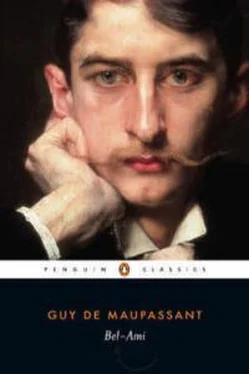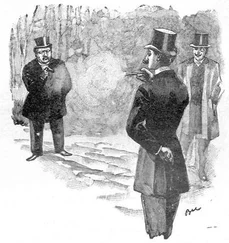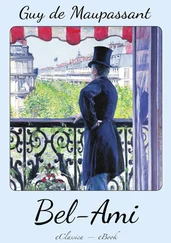Mme. Walter, surrounded by friends, stood in the second salon and received the visitors. Many did not know her, and walked through the rooms as if in a museum—without paying any heed to the host and hostess.
When Virginie perceived Du Roy, she grew livid and made a movement toward him; then she paused and waited for him to advance. He bowed ceremoniously, while Madeleine greeted her effusively. Georges left his wife near Mme. Walter and mingled with the guests. Five drawing–rooms opened one into the other; they were carpeted with rich, oriental rugs, and upon their walls hung paintings by the old masters. As he made his way through the throng, some one seized his arm, and a fresh, youthful voice whispered in his ear: "Ah, here you are at last, naughty Bel–Ami! Why do we never see you any more?"
It was Suzanne Walter, with her azure eyes and wealth of golden hair. He was delighted to see her, and apologized as they shook hands.
"I have been so busy for two months that I have been nowhere."
She replied gravely: "That is too bad. You have grieved us deeply, for mamma and I adore you. As for myself, I cannot do without you. If you are not here, I am bored to death. You see I tell you so frankly, that you will not remain away like that any more. Give me your arm; I will show you 'Christ Walking on the Water' myself; it is at the very end, behind the conservatory. Papa put it back there so that everyone would be obliged to go through the rooms. It is astonishing how proud papa is of this house."
As they walked through the rooms, all turned to look at that handsome man and that bewitching girl. A well–known painter said: "There is a fine couple." Georges thought: "If my position had been made, I would have married her. Why did I never think of it? How could I have taken the other one? What folly! One always acts too hastily—one never reflects sufficiently." And longing, bitter longing possessed him, corrupting all his pleasure, rendering life odious.
Suzanne said: "You must come often, Bel–Ami; we can do anything we like now papa is rich."
He replied: "Oh, you will soon marry—some prince, perhaps, and we shall never meet any more."
She cried frankly: "Oh, oh, I shall not! I shall choose some one I love very dearly. I am rich enough for two."
He smiled ironically and said: "I give you six months. By that time you will be Madame la Marquise, Madame la Duchesse, or Madame la Princesse, and you will look down upon me, Mademoiselle."
She pretended to be angry, patted his arm with her fan, and vowed that she would marry according to the dictates of her heart.
He replied: "We shall see; you are too wealthy."
"You, too, have inherited some money."
"Barely twenty thousand livres a year. It is a mere pittance nowadays."
"But your wife has the same."
"Yes, we have a million together; forty thousand a year. We cannot even keep a carriage on that."
They had, in the meantime, reached the last drawing–room, and before them lay the conservatory with its rare shrubs and plants. To their left, under a dome of palms, was a marble basin, on the edges of which four large swans of delftware emitted the water from their beaks.
The journalist stopped and said to himself: "This is luxury; this is the kind of house in which to live. Why can I not have one?"
His companion did not speak. He looked at her and thought once more: "If I only had taken her!"
Suddenly Suzanne seemed to awaken from her reverie. "Come," said she, dragging Georges through a group which barred their way, and turning him to the right. Before him, surrounded by verdure on all sides, was the picture. One had to look closely at it in order to understand it. It was a grand work—the work of a master—one of those triumphs of art which furnishes one for years with food for thought.
Du Roy gazed at it for some time, and then turned away, to make room for others. Suzanne's tiny hand still rested upon his arm. She asked:
"Would you like a glass of champagne? We will go to the buffet; we shall find papa there."
Slowly they traversed the crowded rooms. Suddenly Georges heard a voice say: "That is Laroche and Mme. du Roy."
He turned and saw his wife passing upon the minister's arm. They were talking in low tones and smiling into each other's eyes. He fancied he saw some people whisper, as they gazed at them, and he felt a desire to fall upon those two beings and smite them to the earth. His wife was making a laughing–stock of him. Who was she? A shrewd little parvenue, that was all. He could never make his way with a wife who compromised him. She would be a stumbling–block in his path. Ah, if he had foreseen, if he had known. He would have played for higher stakes. What a brilliant match he might have made with little Suzanne! How could he have been so blind?
They reached the dining–room with its marble columns and walls hung with old Gobelins tapestry. Walter spied his editor, and hastened to shake hands. He was beside himself with joy. "Have you seen everything? Say, Suzanne, have you shown him everything? What a lot of people, eh? Have you seen Prince de Guerche? he just drank a glass of punch." Then he pounced upon Senator Rissolin and his wife.
A gentleman greeted Suzanne—a tall, slender man with fair whiskers and a worldly air. Georges heard her call him Marquis de Cazolles, and he was suddenly inspired with jealousy. How long had she known him? Since she had become wealthy no doubt. He saw in him a possible suitor. Some one seized his arm. It was Norbert de Varenne. The old poet said: "This is what they call amusing themselves. After a while they will dance, then they will retire, and the young girls will be satisfied. Take some champagne; it is excellent."
Georges scarcely heard his words. He was looking for Suzanne, who had gone off with the Marquis de Cazolles; he left Norbert de Varenne abruptly and went in pursuit of the young girl. The thirsty crowd stopped him; when he had made his way through it, he found himself face to face with M. and Mme. de Marelle. He had often met the wife, but he had not met the husband for some time; the latter grasped both of his hands and thanked him for the message he had sent him by Clotilde relative to the stocks.
Du Roy replied: "In exchange for that service I shall take your wife, or rather offer her my arm. Husband and wife should always be separated."
M. de Marelle bowed. "Very well. If I lose you we can meet here again in an hour."
The two young people disappeared in the crowd, followed by the husband. Mme. de Marelle said: "There are two girls who will have twenty or thirty millions each, and Suzanne is pretty in the bargain."
He made no reply; his own thought coming from the lips of another irritated him. He took Clotilde to see the painting. As they crossed the conservatory he saw his wife seated near Laroche–Mathieu, both of them almost hidden behind a group of plants. They seemed to say: "We are having a meeting in public, for we do not care for the world's opinion."
Mme. de Marelle admired Karl Marcovitch's painting, and they turned to repair to the other rooms. They were separated from M. de Marelle. He asked: "Is Laurine still vexed with me?"
"Yes. She refuses to see you and goes away when you are mentioned."
He did not reply. The child's sudden enmity grieved and annoyed him.
Suzanne met them at a door and cried: "Oh, here you are! Now, Bel–Ami, you are going to be left alone, for I shall take Clotilde to see my room." And the two women glided through the throng. At that moment a voice at his side murmured: "Georges!"
It was Mme. Walter. She continued in a low voice: "How cruel you are! How needlessly you inflict suffering upon me. I bade Suzanne take that woman away that I might have a word with you. Listen: I must speak to you this evening—or—or—you do not know what I shall do. Go into the conservatory. You will find a door to the left through which you can reach the garden. Follow the walk directly in front of you. At the end of it you will see an arbor. Expect me in ten minutes. If you do not meet me, I swear I will cause a scandal here at once!"
Читать дальше











